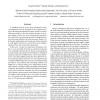Free Online Productivity Tools
i2Speak
i2Symbol
i2OCR
iTex2Img
iWeb2Print
iWeb2Shot
i2Type
iPdf2Split
iPdf2Merge
i2Bopomofo
i2Arabic
i2Style
i2Image
i2PDF
iLatex2Rtf
Sci2ools
184
click to vote
ISCA
2012
IEEE
2012
IEEE
Lane decoupling for improving the timing-error resiliency of wide-SIMD architectures
A significant portion of the energy dissipated in modern integrated circuits is consumed by the overhead associated with timing guardbands that ensure reliable execution. Timing speculation, where the pipeline operates at an unsafe voltage with any rare errors detected and resolved by the architecture, has been demonstrated to significantly improve the energy-efficiency of scalar processor designs. Unfortunately, applying the same timing-speculative approach to wide-SIMD architectures, such as those used in highlyefficient GPUs, may not provide similar gains. In this work, we make two important contributions. The first is a set of models describing a parametrized general error probability function that is based on measurements of a fabricated chip and the expected efficiency benefits of timing speculation in a SIMD context. The second contribution is a decoupled SIMD pipeline that more effectively utilizes timing speculation and recovery, when compared with a standard SIMD desi...
| Added | 28 Sep 2012 |
| Updated | 28 Sep 2012 |
| Type | Journal |
| Year | 2012 |
| Where | ISCA |
| Authors | Evgeni Krimer, Patrick Chiang, Mattan Erez |
Comments (0)

